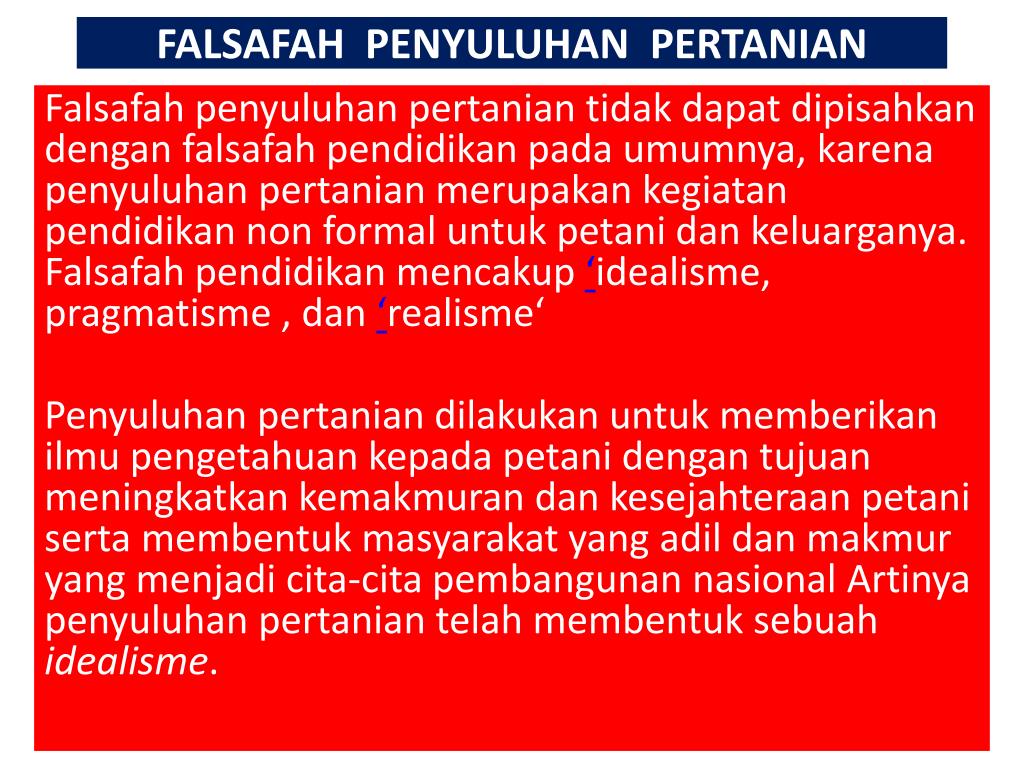
Prinsip adalah suatu pernyataan tentang kebijaksanaan yang dijadikan pedoman dalam pengambilan keputusan dan melaksanakan kegiatan secara konsisten (Mathews, 1995). Dipublikasi pada 9 Juni 2015 oleh bapelluhbrebes. Prinsip-prinsip Penyuluhan Pertanian.
Berkaitan dengan itu, Ensminger dalam Mardikanto (2009) mencatat adanya 11 (sebelas) rumusan tentang falsafah penyuluhan.Used for oral and written communication as well as writing skill in proper way.Used for Understanding and usefulness of mathematics History of mathematics Cluster/set, Mathematical reasoning, Matrices Composition Function, Inverse Function, Vector, Changing Function, Gradient and Line Equation, Quadratic Functions, Polynomial Functions, Multiple Tribes. Falsafah dalam bahasa Greek berarti love of wisdom, cinta akan kebijaksanaan yakni menunjukkan harapan/kemajuan untuk mencari fakta dan nilai kehidupan yang luhur.AGRICULTURE FACULTY OF UNIVERSITAS NASIONALDalam khasanah kepustakaan penyuluhan pertanian, banyak di jumpai beragam falsafah penyuluhan pertanian. Dalam bahasa Yunani adalah philosophia (philo cinta Sophia hikmah). Kata falsafah adalah bahasa Arab. Dan kebudayaan Minangkabau yang menganut falsafah Adat Bersendi Syara.2.2 Falsafah Penyuluhan Dan Komunikasi Pertanian. CURRICULUM OF AGROTECHNOLOGY STUDY PROGRAMDocument Repository Universitas Andalas Peran Balai Penyuluhan Pertanian (BPP).
Falsafah Penyuluhan Pertanian Trial Development And
The role of the agricultural sector in national development that includes income-generating activities and public welfare, improvement of gross dosmetic products, foreign exchange, industrial development and agricultural industrialization. It also discusses population growth on agricultural and environmental resources. Introduction to Organic Chemistry, Alkanes and Cycloalkanes, Alkene and Alkaline, Aromatic Compounds, Organohalogen, Alcohol, Phenol and Ether, Aldehydes, Carboxylic Acids, Amyria, Carbohydrates, Amino Acids, Proteins, Lipids.This course aims to provide basic knowledge of management that includes: understanding, elements, management functions, management processes through the approach of planning, organizing, mobilizing and supervising functions.This course discusses the understanding and development of agriculture, the system of agriculture covering subordinate systems of production, postharvest and consumption, and the role of basic science in agricultural systems.

Management of irrigated agricultural areas and dry soil from hydrology. Origin, nature and classification of parent material.This course discusses the introduction to plant protection, seed in agriculture and its reproduction, biological-ecology and pest behavior, factors affecting pest populations in ecosystems, pest symptoms and attacks and methods of pest control in plants plant pathogens, pathogens and symptomatology, pathogenic types and physiology of plant diseases, inoculum, scattering and surviving pathogens, pathogen penetration and plant defense mechanisms against pathogens, epidemiology of plant disease and plant disease management.Studying aspects of taxonomy, botany, region of origin, distribution, cultivation, nutritional value and processing technology of various food crops (rice, corn, soybeans, cassava, sweet potato, sorghum, sugar cane, peanut).This course discusses the general state of water resources in Indonesia, its prospects and problems, the concept of hydraulics and its application in the field of water management. development of water resources. Air and ground temperatures. Water loss in liquid form and its control.
...

Falsafah Penyuluhan Pertanian Series Of Post
Understanding the landscape and its forming elements and recognize and can identify various forms / types of parks that exist. Garden Architecture Prospects.This course aims to study toxic phases in living organisms, biological processes of toxic compounds, air pollution, heavy metal pollution, global warming, global warming pollution material, water pollution, water pollution management, soil contamination, environmental impact analysis, environmental certification for managing pollution, energy crisis: indonesian case study – japan, pesticide toxicologyIt discusses concepts and objectives of cost accounting, the role of cost accounting in management, cost accounting cycle in job order and process cost method, cost calculation of job order, process and by-product, and analysis of deviations to provide budgeting efficiency. The philosophy and history of its development as well as its relationship with the related sciences. Result quality and yield loss, a series of post-harvest activities at farmer level, cooperatives and food procurement, utilization of results and waste, quality management and quality standardization.It aims to know the scope of landscape.


 0 kommentar(er)
0 kommentar(er)
